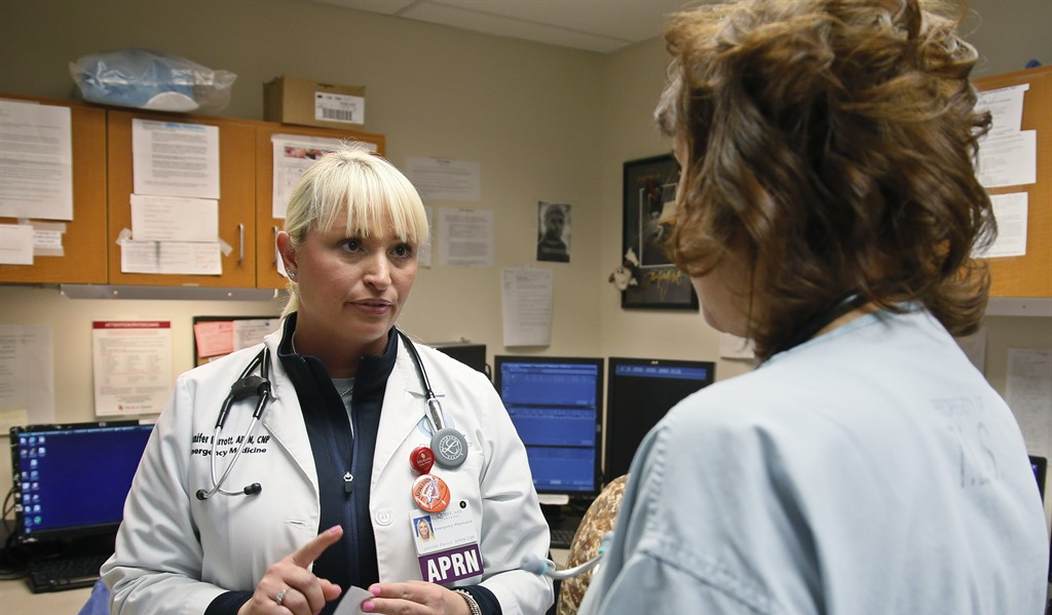As health insurance costs grow and provider networks shrink, more Americans are turning to a cost-effective alternative to traditional third-party insurers, despite the Affordable Care Act’s (ACA) mandate that those who can afford to purchase health insurance do so.
Unlike other federal mandate dodgers in U.S. history, a growing number of insurance dodgers are dodging in full compliance with the law. These are budget-savvy, self-pay patients who have found the best way around the ACA is straight through it.
Carved into the ACA’s individual mandate is an exception for members of health care sharing ministries (HCSMs). Membership in an HCSM costs less than health insurance, accommodates members’ conscientious objections to the ACA, and reduces health care price inflation by placing patients directly in charge of their health care costs.
HCSMs operate similarly to insurers, with important distinctions. Instead of premiums, members pay monthly fees commonly referred to as “shares”—a key word in HCSMs’ faith-based paradigm. Sharing for religious reasons is the basis for HCSMs’ exemption. Groups such as Medi-Share, Samaritan Ministries, and Liberty HealthShare maintain Christians have been cost-sharing to meet each other’s needs since the days of the early church, almost two thousand years ago.
Monthly shares range from approximately $200 per individual to $500 dollars per family. Most organizations collect and redistribute these shares to other members with medical needs, although Samaritan members send shares (and sometimes an encouraging note or prayer) directly to needy members via personal check.
Recommended
The receiving members pay a portion of their own medical expenses, similar to a deductible. A family within the Samaritan’s framework would pay the first $300 for each of their first three non-preventive medical “needs” in a year. Every dollar above this limit is “publishable,” meaning members receive “gifts” (essentially reimbursements) for the remainder of all medical costs—up to $250,000 per need—until the need is met. After a family’s third publishable need in a year, all subsequent needs costing at least $300 are publishable.
This means a typical Samaritan family pays a quasi-premium of $405 per month ($4,860 per year), for a quasi-deductible as low as $900 per year plus smaller-dollar non-publishable expenses.
Contrast these costs to those of health insurance. In 2015, the average family coverage premium was $17,545 per year, with employees contributing $4,955, according to the Kaiser Family Foundation’s 2015 Employer Health Benefits Survey. Employees with high deductible health plans were then liable to pay a family coverage deductible of $4,345 on average, with 19 percent having an aggregate family deductible of at least $6,000, states the same report. The legal limit on out-of-pocket maximums for family coverage was $13,200.
Despite the huge savings HCSMs offer members over health insurance, many members turn to HCSMs because of conscience instead of cost. “Members are joining primarily on principle, not price,” Anthony Hopp, Samaritan’s director of membership development, told Health Care News]]]on April 7. “It’s a biblical health care option that is consistent with their religious beliefs.”
HCSMs attract some members who qualify for federal subsidies or Medicaid expansion under the ACA, but who morally object to receiving taxpayer-funded premium assistance when reasonably priced non-government alternatives are available. Other HCSM members are convinced, or at least suspicious, a small portion of the premiums they would pay for ACA-compliant health insurance might be used indirectly to fund abortions.
Frugal and conscientious, HCSM members benefit the entire health care system by helping to stem the inflation of health care prices. Most members are self-pay patients who frequently pay cash at the time of service, expecting to receive quasi-reimbursements (gifts in the form of others’ shares) in the following months.
As self-payers, members are predisposed to negotiate discounts with providers, who are glad to increase their profit margin by cutting out middle-man insurers. Such savings lower the bottom line for HCSMs, some of which financially reward members who earn large discounts. By contrast, insured individuals typically have no idea what their health care actually costs, and many try to max out their annual deductibles to gain the illusion of “free” health care the rest of the year.
Cost-effective, principled, and patient-driven, HCSMs are the holy grail of health care insurance alternatives. Or, to frame it in terms familiar to HCSM members: What profit it a man to gain health insurance but lose his soul?























Join the conversation as a VIP Member